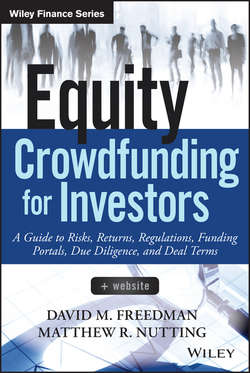Читать книгу Equity Crowdfunding for Investors - Matthew R. Nutting - Страница 9
На сайте Литреса книга снята с продажи.
Preface: The New Angel Investors
Enter at Your Own Risk
ОглавлениеAlthough the door to angel investing, at least the online version, is now open to all investors, not everyone is prepared to walk through it. Investors who have never done an angel deal, even those who consider themselves sophisticated when it comes to investing in publicly listed stocks and bonds, need to get familiar with a new universe of securities investing. Seed and early-stage investments include substantial risks as well as the possibility of exciting returns and benefits. You need to understand how angel investments can affect your overall portfolio in terms of diversification, asset allocation, liquidity, and long-term financial objectives. That will be covered in Chapter 8.
For all investors, including accredited investors who have actually done angel capital deals but don't understand the nature of crowdfunding, we will delve into the evolution of crowdfunding, from donation- and rewards-based crowdfunding to lending- and equity-based crowdfunding. This brief history offers lessons about the risks, rewards, occurrence of fraud, and wisdom of the crowd (or madness of it, depending on the context).
Ultimately, for those of you who have carefully weighed the pros and cons and believe that you (and/or your community) will benefit from investing in startups and growing private companies, we present four chapters on how to invest, including guidance on the following topics:
• Budgeting for angel investments, including the need for “dry powder” reserves.
• Setting realistic expectations for returns, liquidity, and management participation.
• Deciding what kind of industry, company, and development stage (seed, startup, growth, or later) to invest in.
• Identifying your primary motivation for angel investing: financial gain or community development.
• Selecting the appropriate crowdfunding portal(s) or broker-dealer(s) among dozens or hundreds in the marketplace.
• Conducting (and/or relying on the crowd or lead investors to conduct) due diligence, such as researching the company founders and reviewing their financial projections.
• Understanding the deal terms, especially what sort of securities you are buying, and what your rights and obligations are as a shareholder.
• Monitoring the companies you invest in and managing your crowdfunding portfolio.
• Understanding the likely time, place, and manner of your exit from your investment (where angel investors “cash out”), including secondary markets, management buybacks, mergers and acquisitions, IPOs, and other exit strategies.
